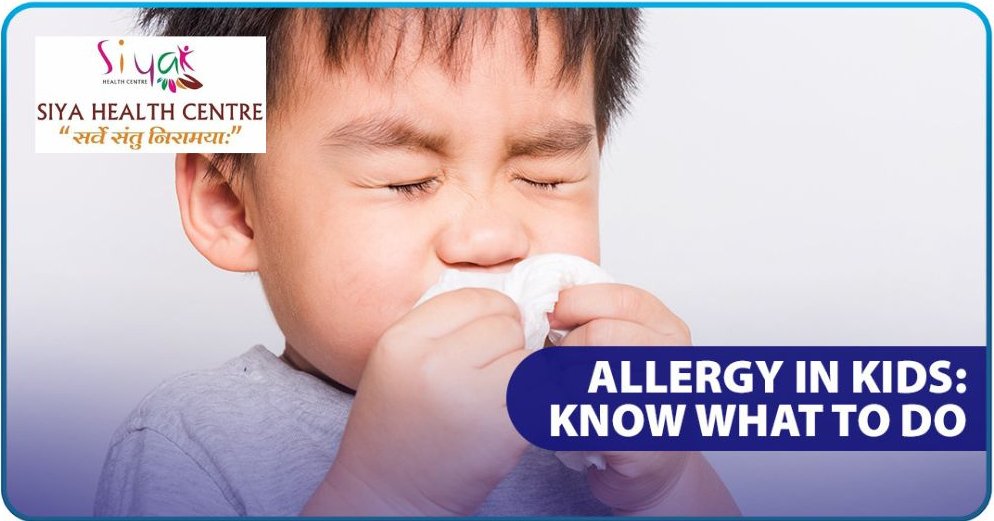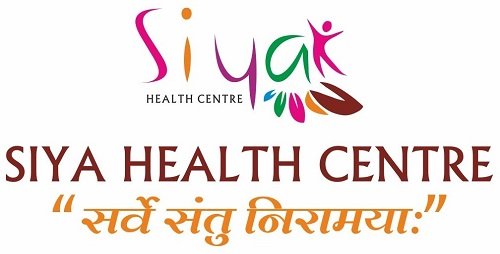MANAGING ALLERGIES
Allergies in kids happen when their immune system reacts to harmless things like pollen, food, or pet dander. This strong reaction can cause mild to severe symptoms. Dr. Ratnesh Khare, a top pediatrician in Indore, offers specialized care for children with allergies at Siya Health Care. Recognizing and treating allergies early can greatly improve a kid’s life, preventing problems and ensuring they get the right treatments and lifestyle changes they need.
At Siya Health Care, Dr. Ratnesh Khare focuses on identifying common allergens and their effects on children. Allergic reactions can impact different parts of the body like the skin, breathing, and stomach. Dr. Khare provides thorough care and personalized treatment plans to help families handle and reduce the effects of allergies, ensuring children have healthier and more comfortable lives.

Common Allergy Symptoms in Kids:
Kids with allergies often experience these symptoms:
Sneezing and Runny Nose
They might sneeze a lot and have a nose that is stuffy or runs because their nose is swollen inside.
Itchy, Watery Eyes
Their eyes may become red, itchy, and watery. This is called allergic conjunctivitis.
Skin Rashes
Sometimes, kids get hives or eczema, which makes their skin itchy, red, and swollen.
Breathing Issues
Allergies can make it hard for kids to breathe. They might wheeze, have trouble breathing, or cough a lot. This is called asthma or allergic rhinitis.
Digestive Problems
If they have food allergies, eating certain foods might make them feel sick. They could have nausea, vomiting, stomach pain, or diarrhea.
Swelling
In severe cases, like anaphylaxis, parts of their body might swell, such as their lips, tongue, or throat. This needs immediate medical help.
Understanding these symptoms helps parents and doctors like Dr. Ratnesh Khare at Siya Health Care diagnose and treat allergies to keep kids healthy and comfortable.
Book Your Consultation Today Child Specialist in Indore– Dr. Ratnesh Khare
Causes of Allergies in Kids:
Genetics
Children with a family history of allergies are more likely to develop them. Dr. Ratnesh Khare at Siya Health Care reviews family medical histories to spot potential risks.
Environmental Factors
Exposure to pollen, dust mites, mold, and pet dander can trigger allergies in sensitive children.
Food Allergies
Common food allergens like milk, eggs, peanuts, tree nuts, soy, wheat, fish, and shellfish can provoke immune responses in allergic children.
Insect Stings
Bee stings or bites from other insects can cause localized or systemic allergic reactions in some children.
Medications
Certain medications, such as antibiotics, can trigger allergic reactions, requiring alternative treatments or preventive measures.
Diagnosis of Allergies in Kids:
- Medical History Review: Dr. Ratnesh Khare at Siya Health Care thoroughly reviews the child’s medical history and family background to identify patterns and potential allergens.
- Physical Examination: A comprehensive physical exam helps identify signs of allergic reactions, such as skin rashes or respiratory issues.
- Allergy Testing: Skin prick tests or blood tests (like the IgE test) can pinpoint specific allergens responsible for the child’s symptoms.
- Elimination Diets: For suspected food allergies, Dr. Khare may recommend elimination diets, where potential allergens are removed from the diet to observe symptom changes.
- Challenge Testing: Under medical supervision, small amounts of the suspected allergen are introduced to the child to confirm an allergy diagnosis.
Treatment of Allergies in Kids:
Here are different ways to help kids with allergies feel better, with guidance from Dr. Ratnesh Khare one of the best pediatric at Siya Health Care:
- Avoiding Triggers: It’s important to find out what things make allergies worse and try to stay away from them. Dr. Ratnesh Khare helps families minimize contact with these allergens.
- Medicines: Sometimes, kids need medicines like antihistamines, decongestants, or corticosteroids to help with their symptoms. Dr. Ratnesh Khare prescribes the right medicines for each child.
- Immunotherapy: This special treatment, like allergy shots or tablets under the tongue, can slowly help kids become less sensitive to things that cause allergies.
- Emergency Plans: For really bad allergies, they might need to use a special shot called an epinephrine auto-injector if the reaction is severe.
- Lifestyle Changes: Ratnesh Khare gives advice on things like what to eat, how to change the home to keep allergens away, and when to come in for check-ups to keep track of how well the treatment is working.
Dr. Ratnesh Khare's comprehensive approach to diagnosing and managing allergies in children at Siya Health Care focuses on alleviating symptoms, optimizing allergy causes, and empowering families with education and support. By addressing each child's unique allergy triggers and symptoms, Dr. Khare ensures personalized care that promotes health and enhances quality of life for young patients in Indore and surrounding communities.
Precautions for Kids with Allergies:
Here are important steps to help children with allergies, supported by pediatric doctor and allergy specialist Dr. Ratnesh Khare at Siya Health Care:
Identify Triggers
Recognize things like pollen or certain foods that cause allergic reactions. Try to keep your child away from these triggers when possible.
Keep Medicines Ready
Always have the allergy medications prescribed by Dr. Ratnesh Khare on hand, especially during allergy seasons or when your child might be exposed to allergens.
Educate Others
Teach teachers, caregivers, and family members about your child's allergies. Make sure they know what to do if your child has an unfavorably susceptible reaction.
Watch for Symptoms
Be aware of signs like itching, sneezing, rash, or trouble breathing. If these symptoms happen, take action right away.
Keep Things Clean
Keep your home clean to reduce allergens such as dust, pet fur, and mold. Cover pillows and mattresses with special covers to help lessen exposure.
Healthy Eating
Make sure your child eats a balanced diet with lots of natural products and vegetables. Avoid nourishments that your child is unfavorably susceptible to and examine nourishment names carefully.
Regular Doctor Visits
Visit Dr. Khare regularly so he can check on your child's allergies and adjust treatment as needed.
Following these tips, with the guidance of Dr. Ratnesh Khare, a pediatric doctor and allergy specialist, will help manage your child’s allergies well and keep them safe and healthy.
Book Your Consultation Today Child Specialist in Indore– Dr. Ratnesh Khare
Frequently Asked Questions
Allergies in kids occur when their immune system reacts to normally harmless substances, such as pollen, food, or pet dander. These responses can run from mellow to extreme. Dr. Ratnesh Khare, the best pediatrician in Indore, provides expert care for managing these allergies at Siya Health Care, helping to identify and treat allergic reactions effectively.
Common symptoms include sneezing, runny nose, itchy and watery eyes, skin rashes, breathing difficulties, digestive issues, and swelling. Dr. Ratnesh Khare at Siya Health Care emphasizes recognizing these symptoms early to ensure timely intervention and management.
Yes, immunizations are safe and essential for children, including those with allergies. Dr. Ratnesh Khare at Siya Health Care follows immunization guidelines from the Indian Academy of Pediatrics and the American Academy of Pediatrics to ensure safety and efficacy, even for children with allergic conditions.
Parents can help by identifying and avoiding known allergens, following the prescribed medication regimen, and keeping regular appointments with their pediatrician. Dr. Ratnesh Khare at Siya Health Care offers guidance and support to parents, helping them create a safe and healthy environment for their children.
If your child experiences a severe allergic reaction, like anaphylaxis, parents should take these steps:
- Use an Epinephrine Auto-Injector: If available, give the epinephrine auto-injector as prescribed by Dr. Ratnesh Khare at Siya Health Care. This helps to quickly relieve symptoms.
- Get Immediate Medical Help: Call emergency services or go to the nearest hospital as soon as possible for further treatment.
Dr. Ratnesh Khare, known as the best pediatrician in Indore, ensures families are prepared with emergency plans and proper training to manage such situations effectively.
At Siya Health Care, Dr. Khare focuses on giving intensive care to children with hypersensitivities. By addressing symptoms, identifying causes, and using effective treatments, he helps children live healthier, happier lives, free from the challenges of allergic reactions.

